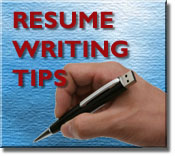
Simple Resume Preparation Tips to Improve Your Resume Writing and Cover Letters
I’ve had a few conversations recently with a wide range of individuals about resumes and cover letters, and I was finding a common theme: whatever the career services people at their school taught them is not really in line with what businesses are looking for today.
 To be clear, this is not a knock or insult to the university/college career services department. They have an enormous value to many students (the ones that actually take the time to seek their input and guidance, anyway). I am looking to provide further insight into and clarification about a few key issues.
To be clear, this is not a knock or insult to the university/college career services department. They have an enormous value to many students (the ones that actually take the time to seek their input and guidance, anyway). I am looking to provide further insight into and clarification about a few key issues.
Having said that, I think there are a few areas they miss, or do not stress enough. The resume and cover letter are about you, but are not just about you. They are about how you are the best candidate to help the company. It’s about making a match!
Cover Letter
- 3 Paragraphs – This may seem short to most of you but, for the most part, recruiters don’t want to spend their day reading your cover letter. Three paragraphs is the perfect length. First paragraph should be an introduction to you and the role you are applying for. Second paragraph is to discuss your experience related to the role. Third paragraph is to close strong with a lead towards an interview. Do not send a full page cover letter.
- Keep it simple – Please do not give your life or career story. Convey your message in succinct sentences that highlight your experience related to the role. Do not write a 10 sentence paragraph either. Get to the point and show your…
- Value Proposition – You need to convey why your experience makes you the ideal candidate for the company in the particular role. Companies do not care how they can help you achieve your personal or career goals, companies care about how you will help them achieve their goals. You may ultimately get a lot out of the opportunity, but that is not why a company will hire you.
- Include all of your contact information
Resume
- Mission Statement – Similar to how companies create their own mission statement, you should consider creating a personal mission statement. This is a nice way to highlight your experience and provide a little insight into you. A nice resource to look at is from Randall Hansen that provides a 5-step plan for a personal mission statement.
- Action Words – This is such an easy point but one that so many of us don’t do well. The majority of us use passive words such as “participated” or “assisted” instead of true action words. This may lead you to a little revision on your resume but it is a must to highlight the work you actually performed. Consider the action words from SeekingSuccess.com to help get you started.
- Value Proposition – Again, you must continue to assert why you are the ideal candidate for the particular role. Your resume should reflect the work you performed and how it relates to what the position you are applying is seeking. You will probably need to revise your resume for each position to highlight the particular experience. This is not lying, this is responding directly to each position and treating it like an interview question.
As you can see, value is the critical thread for both the cover letter and the resume. However, value is most important to the company to which you are applying. Express your personal interest and why you are the right person for the job but always focus on how you will make the company better.
Image credit goes to MinorityJobs.net
—
Keith McIlvaine manages the recruiting social media strategy for a Fortune 500 company and is an avid networker. He is a social media advisor, coach, speaker, blogger and an all around fanatic. Connect with Keith on LinkedIn, Twitter and Facebook. (The statements posted on this site are mine alone and do not necessarily reflect the views of my employer)
